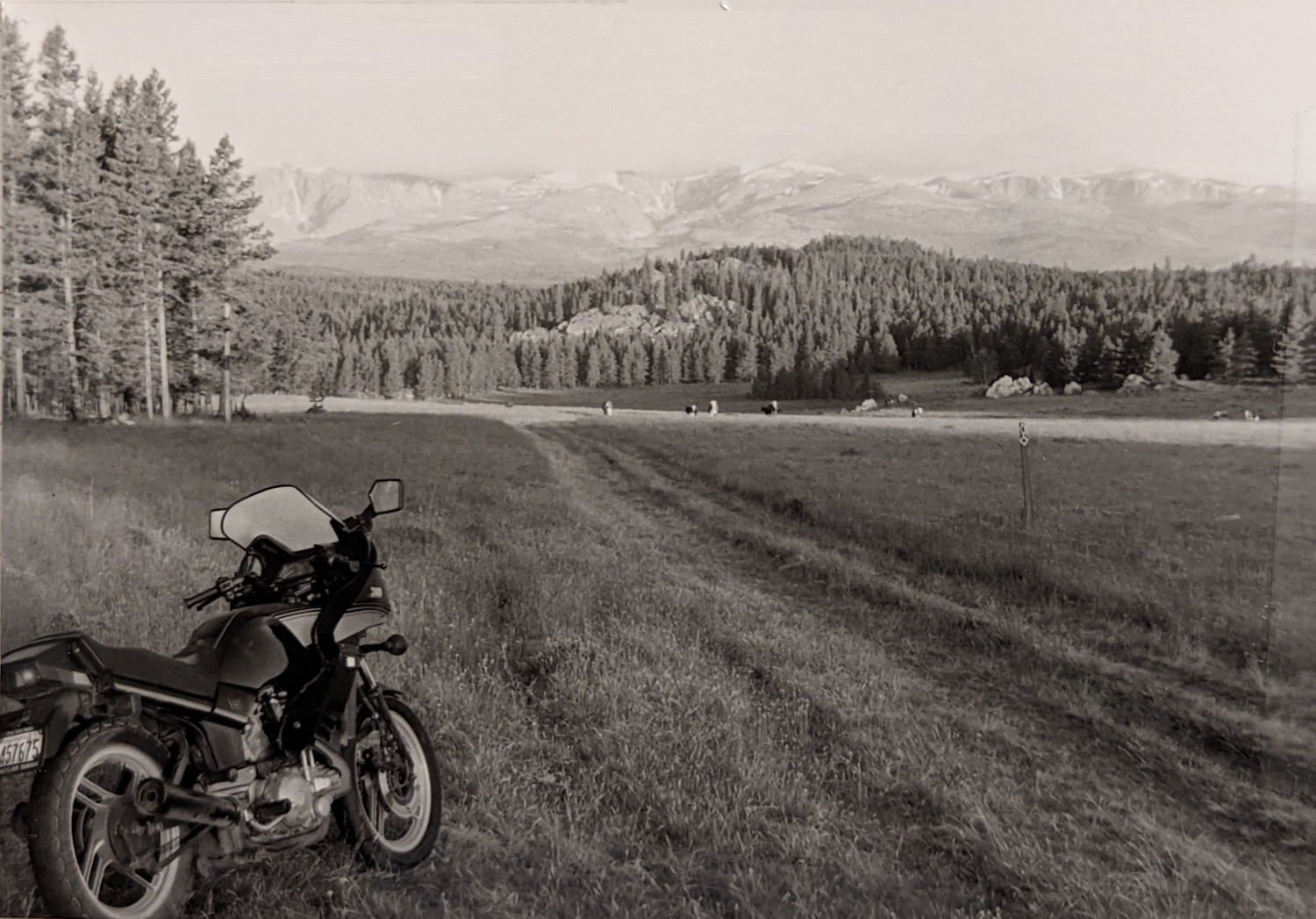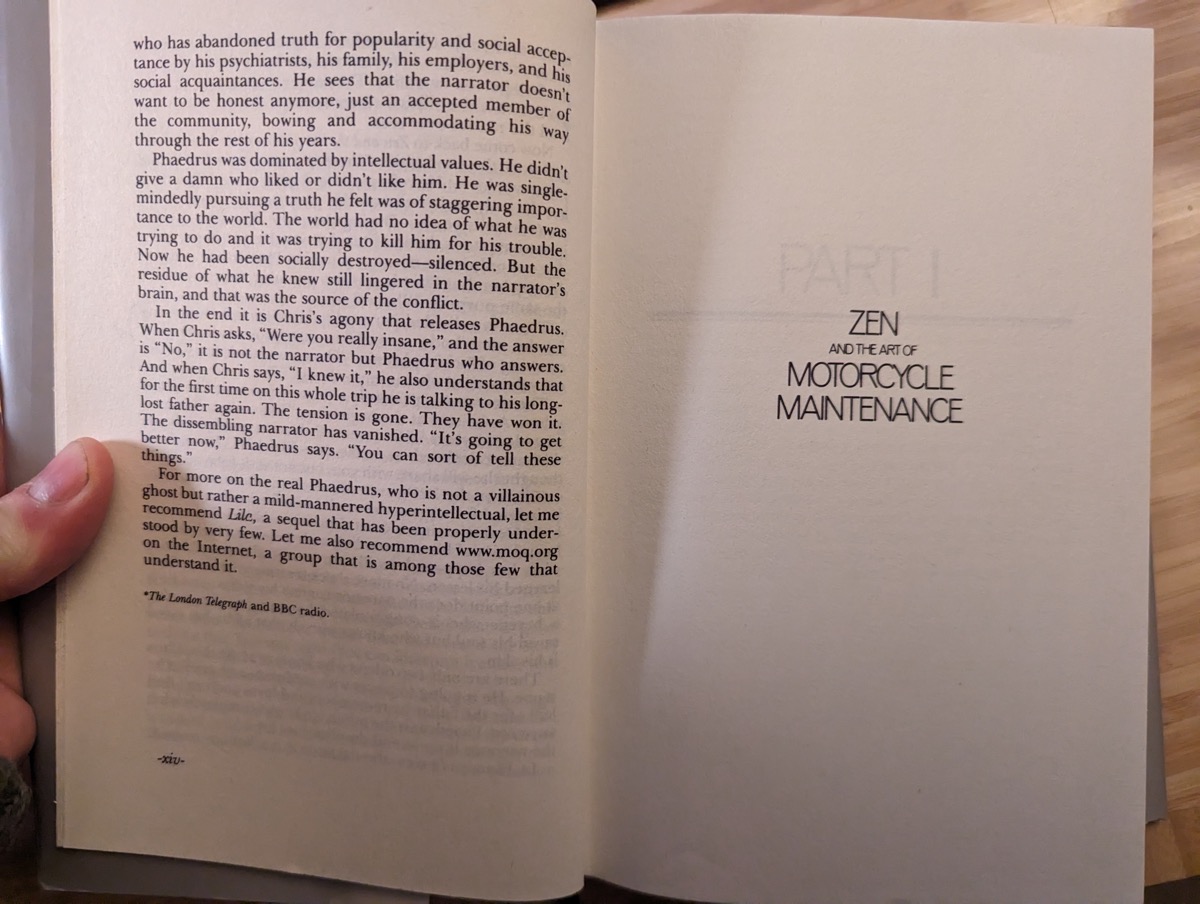Why I decided to reread Zen and the Art of Motorcycle Maintenance (ZAMM series)
Reasons for rereading
As I was catching up on some recent videos from WTD Portland 2023 (a conference I missed), one talk in particular caught my attention: Dan Grabski’s Zen And The Art Of Automanually Creating API Documentation — An Inquiry Into Process. In a nutshell, Grabski argues for processes that combine technology and people in balanced ways. You can’t create technical scripts to automate everything; your process needs to include input and feedback from people, considering their differing viewpoints. To make his point, Dan draws upon Robert Pirsig’s Zen and the Art of Motorcycle Maintenance.
After listening to Grabski’s talk, I started thinking more about Zen and the Art of Motorcycle Maintenance, a book I’d read nearly 30 years ago. I run a book club at work focused on auto and transportation books, and started thinking that maybe Zen and the Art of Motorcycle Maintenance would be good to read. I also began to consider that maybe, since Pirsig was a technical writer, the book had more common threads and application with my own life than I’d realized. The following sections describe a few parallels.
Motorcycles
I’d first read Zen and the Art of Motorcycle Maintenance graduating from high school during my summer before college. That summer after high school, I read Cormac McCarthy’s All the Pretty Horses, Miguel Cervantes’ Don Quixote, and about half of Robert Pirsig’s Zen and the Art of Motorcycle Maintenance. Any 17-year-old who reads these books during a lazy summer will come to one inevitable conclusion: he needs to go on a road trip of his own.
During my last two years of high school, I had a 650 cc Yamaha motorcycle that I rode pretty much anywhere in Tacoma, Washington, where I went to high school. On Sunday afternoons I would go on long rides on the winding roads behind Fort Lewis, a military base. I’d also gone on longer trips, riding along the Columbia River and into Eastern Oregon with my Dad, who also rode a motorcycle for a few years.
As I started thinking about road trips, I decided to make an epic trip, riding out to Galveston, Texas, to visit an old childhood friend. I would ride from Washington to Texas to visit my friend and then circle back up to college in Utah in the fall.
About three weeks before my college start date, I started my trip. In case you’re unfamiliar with US geography, riding from Washington to Texas is nearly 3,000 miles, especially the non-linear route I took. Because I hadn’t finished Zen and the Art of Motorcycle Maintenance before leaving, I took the book with me to finish it. From Tacoma, I rode across the Cascades past Coeur d’Alene, Idaho, over to Bozeman, Montana. (If you’ve read A River Runs Through It, riding through Montana is a must!). Then I angled down through Wyoming (where there are more cows than people), through Colorado’s high elevations and jagged Rockies, down into flat Oklahoma, and then across windy Texas — camping at various places along the way.

At 17 years old, I probably shouldn’t have gone on this trip alone. I’m not sure how my mother ever let me. My compromise was that I would wear a neon vest over my leather jacket, which I did. I spent about a week making my way to Galveston. Once there, I stayed with my childhood buddy for a week before circling back up to Colorado for an outdoor camp, then over to Utah where I started college. When I started college, I sensed the winter snow coming and felt I wouldn’t need a motorcycle since I was living on campus. So I traded my motorcycle for a computer (my first) and started writing.
Unlike the narrator in Zen and the Art of Motorcycle Maintenance, I didn’t have any traveling companions or deep philosophical musings on my trip, but it was still formative for me. I realized how lonely the road could be and how I preferred more human interaction (especially after camping alone for a week). But I also enjoyed the freedom of the road and autonomy of riding on a motorcycle. There’s nothing quite like it—sitting right on top of an engine, leaning left and right around curves, and feeling immersed in the open elements.
Teaching writing and rhetoric
Fast forward 30 years later, as I’m rereading Zen and the Art of Motorcycle Maintenance (ZAMM). Besides relating to the motorcycle elements in ZAMM, I can also relate to the narrator’s experiences in teaching writing and rhetoric. In the book, the narrator teaches rhetoric and writing to undergraduates at a college in Montana while also pursuing his own PhD at another campus. During my undergraduate years, I worked as a writing tutor assigned to various literature classes. Then after finishing my undergraduate degree, I began an MFA program in New York, where I taught composition first as a graduate instructor for two years, both to adult first-years and regular first-years.
After graduating, I spent two years at the American University of Cairo in Egypt teaching similar composition writing courses to first- and second-year Egyptian students. I loved teaching writing (especially good classroom discussions) but disliked the grading of essays. Grading essays always made me grumpy, and only a few students actually improved their writing, it seemed.
Technical writer
Besides the motorcycle and teaching themes, the main overlap is that Pirsig’s narrator is also a technical writer. After deciding that teaching composition wasn’t for me, I steered my career into technical writing in 2005. I’ve been working as a technical writer documenting software and APIs ever since, both at startups and big tech companies. Most readers know me only through my writing about technical writing, so this part of my life hardly needs repeating. For a long-winded explanation of my career trajectory, see my life story.
Pirsig was a technical writer back in the 1970s and worked on missile systems maintenance documentation (see this interview here for Pirsig’s full backstory). There might be a lot of differences in documenting missiles versus documenting APIs. One difference might extend to working with physical machines (like motorcycles) versus code, but many principles are the same. I think ethically, it must have been difficult to document technological weapons.
Non-parallels: mental illness, theories of philosophy, maintenance skills
Despite these parallels with ZAMM, I’ve never struggled with mental illness nor undergone electroshock therapy, as the ZAMM narrator has. (It’s not mentioned explicitly in the book, but it’s assumed the narrator had a form of schizophrenia.)
I’ve also never been obsessed with rhetoric versus dialectic or classic versus romantic dualities. These are central themes for the ZAMM narrator. He develops a philosophy theory about Quality over the course of 400 pages. I’ve never been this philosophically minded or intellectually rigorous, nor do I have an IQ of 170.
Also, I don’t know how to do my own motorcycle maintenance. I can barely change the oil in my car, let alone tune a motorcycle. I’m not the type of person who dismantles an engine to see how it works and wonders why everyone around him doesn’t fix his own motorcycle, car, or bicycle. I do some basic bike repairs, but nothing noteworthy. I don’t have an engineering “knack” for fixing things. About half the things I try to fix become more broken as a result.
Ambivalent relationships with technology
Like the narrator, I’ve struggled to define my relationship with technology, which you can see in series like Journey away from smartphones, in which I stripped back my smartphone in an attempt to regain my attention and focus. I’ve been to India to present at a conference but haven’t studied eastern practices like Zen Buddhism in extended ways.
Five years ago, I used the Calm Meditation app about ten minutes each day for a stretch of two months before abandoning it. I got a taste of mindfulness but never exceeded short guided meditations. Even so, I’ve been wanting to notice more of the missed details around me. I recently read Rob Walker’s The Art of Noticing and have been seeking ways to see more of the unseen perspective. I do like finding new details in previously familiar environments.
Kids and concerns for their well-being
In ZAMM, the narrator has an 11-year-old son Chris riding on the back of his motorcycle, and he fears that his son might be developing similar mental illness issues as the narrator, which breaks the narrator’s heart.
I can relate to seeing a child’s optimism toward life while also sensing they’re unknowingly struggling with some mental/emotional challenges. I have four kids, ranging from ages 13 to 22. They’re brilliant; they also have some challenges from ADHD to anxiety.
Questions to get out of ZAMM
After listening to Grabski’s talk, I started thinking that maybe rereading ZAMM would be a good idea. Of course, I’d forgotten almost all the details of the book, having read it 30 years earlier. In re-reading my journal at that time, I realize that I didn’t understand much of the book, and I didn’t find it particularly enjoyable at the time (the narrator does a lot of philosophizing, which can be hard to follow at times).
In rereading the text, I wondered the following:
- How would I interpret ZAMM differently now, as a technical writer, than when I was a 17-year-old high school graduate?
- How would my life’s experiences change and shape my interpretation of the book?
- Could I see the book in a light that others wouldn’t see?
- Were there clues and themes in the book that perhaps steered my life into technical writing before I was aware that I would go in this direction?
With this backstory, let me jump more into ZAMM. My takes on the book won’t be academic but will be more personal thoughts and applications, related mostly to technical writing.

Go to the next post, Main takeaway: How to incorporate intuitive thinking.
About Tom Johnson

I'm an API technical writer based in the Seattle area. On this blog, I write about topics related to technical writing and communication — such as software documentation, API documentation, AI, information architecture, content strategy, writing processes, plain language, tech comm careers, and more. Check out my API documentation course if you're looking for more info about documenting APIs. Or see my posts on AI and AI course section for more on the latest in AI and tech comm.
If you're a technical writer and want to keep on top of the latest trends in the tech comm, be sure to subscribe to email updates below. You can also learn more about me or contact me. Finally, note that the opinions I express on my blog are my own points of view, not that of my employer.

